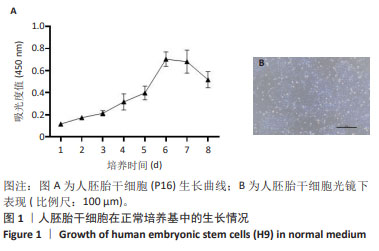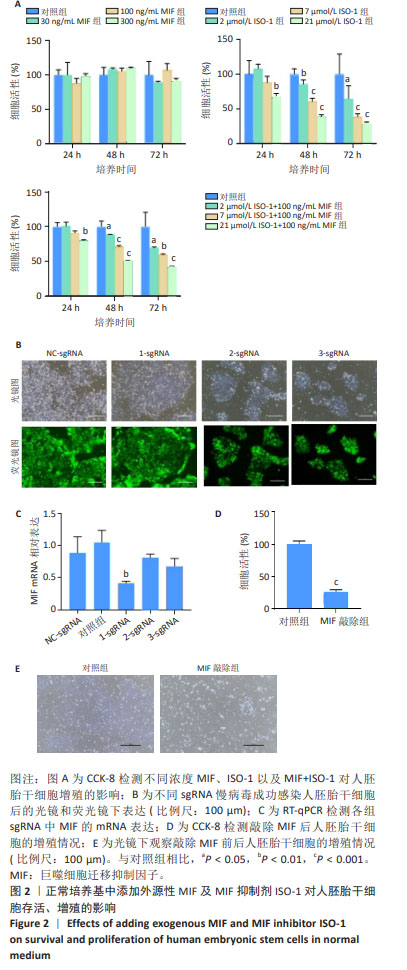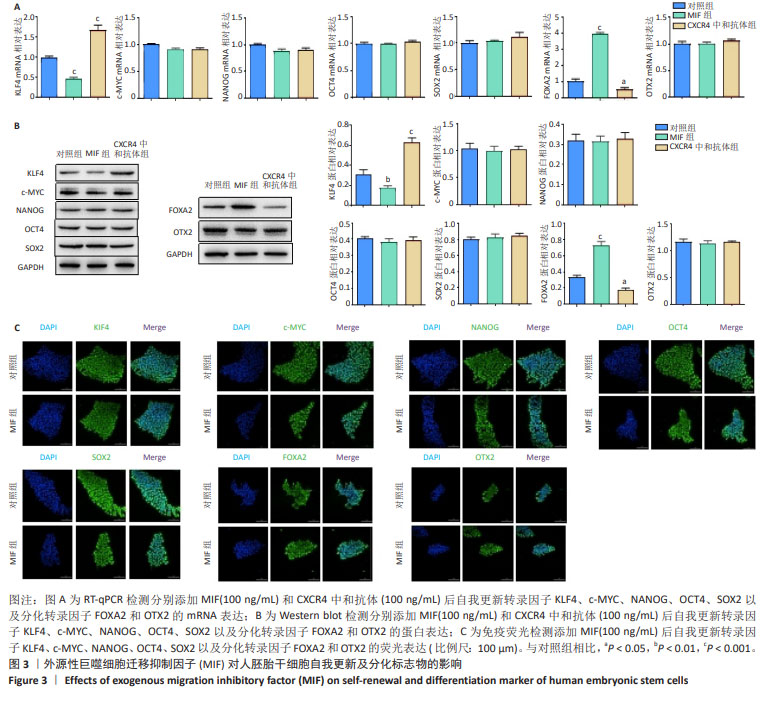[1] CHEN G, YIN S, ZENG H, et al. Regulation of Embryonic Stem Cell Self-Renewal. Life (Basel). 2022;12(8):1151.
[2] VARZIDEH F, GAMBARDELLA J, KANSAKAR U, et al. Molecular Mechanisms Underlying Pluripotency and Self-Renewal of Embryonic Stem Cells. Int J Mol Sci. 2023;24(9):8386.
[3] GOLCHIN A, CHATZIPARASIDOU A, RANJBARVAN P, et al. Embryonic Stem Cells in Clinical Trials: Current Overview of Developments and Challenges. Adv Exp Med Biol. 2021;1312:19-37.
[4] KUMAR D, BALIGAR P, SRIVASTAV R, et al. Stem Cell Based Preclinical Drug Development and Toxicity Prediction. Curr Pharm Des. 2021; 27(19):2237-2251.
[5] FANG T, LIU L, SONG D, et al. The role of MIF in periodontitis: A potential pathogenic driver, biomarker, and therapeutic target. Oral Dis. 2023. doi: 10.1111/odi.14558.
[6] SUMAIYA K, LANGFORD D, NATARAJASEENIVASAN K, et al. Macrophage migration inhibitory factor (MIF): A multifaceted cytokine regulated by genetic and physiological strategies. Pharmacol Ther. 2022;233:108024.
[7] 郑晓晗,冯晓丽,胡兰,等.巨噬细胞迁移抑制因子促进人胚胎干细胞分化为腹侧中脑多巴胺能神经祖细胞[J].中国组织工程研究, 2023,27(33):5348-5356.
[8] JOVANOVIĆ KRIVOKUĆA M, VILOTIĆ A, STEFANOSKA I, et al. Macrophage migration inhibitory factor in human early pregnancy events and association with placental pathologies. Placenta. 2021; 116:51-57.
[9] WEI Y, ZHENG X, HUANG T, et al. Human embryonic stem cells secrete macrophage migration inhibitory factor: A novel finding. PLoS One. 2023;18(8):e0288281.
[10] ALAMPOUR-RAJABI S, EL BOUNKARI O, ROT A, et al. MIF interacts with CXCR7 to promote receptor internalization, ERK1/2 and ZAP-70 signaling, and lymphocyte chemotaxis. FASEB J. 2015;29(11): 4497-4511.
[11] BERNHAGEN J, KROHN R, LUE H, et al. MIF is a noncognate ligand of CXC chemokine receptors in inflammatory and atherogenic cell recruitment. Nat Med. 2007;13(5):587-596.
[12] 魏艳召,郑晓晗,高仕君,等.人胚胎干细胞自分泌巨噬细胞迁移抑制因子及受体表达[J].中国组织工程研究,2023,27(1):34-41.
[13] GÜNTHER S, FAGONE P, JALCE G, et al. Role of MIF and D-DT in immune-inflammatory, autoimmune, and chronic respiratory diseases: from pathogenic factors to therapeutic targets. Drug Discov Today. 2019;24(2):428-439.
[14] 郑晓晗,魏艳召,黄婷,等.巨噬细胞迁移抑制因子对干细胞的作用[J].中国组织工程研究,2023,27(15):2395-2403.
[15] SONG S, XIAO Z, DEKKER FJ, et al. Macrophage migration inhibitory factor family proteins are multitasking cytokines in tissue injury. Cell Mol Life Sci. 2022;79(2):105.
[16] NISHIHIRA J. Macrophage migration inhibitory factor (MIF): its essential role in the immune system and cell growth. J Interferon Cytokine Res. 2000;20(9):751-762.
[17] FARIA MR, HOSHIDA MS, FERRO EA, et al. Spatiotemporal patterns of macrophage migration inhibitory factor (Mif) expression in the mouse placenta. Reprod Biol Endocrinol. 2010;8:95.
[18] MORA BARTHELMESS R, STIJLEMANS B, VAN GINDERACHTER JA. Hallmarks of Cancer Affected by the MIF Cytokine Family. Cancers (Basel). 2023;15(2):395.
[19] OHTA S, MISAWA A, FUKAYA R, et al. Macrophage migration inhibitory factor (MIF) promotes cell survival and proliferation of neural stem/progenitor cells. J Cell Sci. 2012;125(Pt 13):3210-3220.
[20] ZHANG X, CHEN L, WANG Y, et al. Macrophage migration inhibitory factor promotes proliferation and neuronal differentiation of neural stem/precursor cells through Wnt/β-catenin signal pathway. Int J Biol Sci. 2013;9(10):1108-1120.
[21] XIA W, ZHANG F, XIE C, et al. Macrophage migration inhibitory factor confers resistance to senescence through CD74-dependent AMPK-FOXO3a signaling in mesenchymal stem cells. Stem Cell Res Ther. 2015;6(1):82.
[22] BAI Z, HU K, YU J, et al. Macrophage migration inhibitory factor protects bone marrow mesenchymal stem cells from hypoxia/ischemia-induced apoptosis by regulating lncRNA MEG3. J Zhejiang Univ Sci B. 2022;23(12):989-1001.
[23] SCHINDLER L, DICKERHOF N, HAMPTON MB, et al. Post-translational regulation of macrophage migration inhibitory factor: Basis for functional fine-tuning. Redox Biol. 2018;15:135-142.
[24] HE Z, HE J, XIE K. KLF4 transcription factor in tumorigenesis. Cell Death Discov. 2023;9(1):118.
[25] DHALIWAL NK, MIRI K, DAVIDSON S, et al. KLF4 Nuclear Export Requires ERK Activation and Initiates Exit from Naive Pluripotency. Stem Cell Reports. 2018;10(4):1308-1323.
[26] BOURILLOT PY, SAVATIER P. Krüppel-like transcription factors and control of pluripotency. BMC Biol. 2010;8:125.
[27] MADEDDU P. FoxA2 hunting research identifies the early trail of mesenchymal differentiation. Stem Cell Res Ther. 2013;4(2):40.
[28] BALSALOBRE A, DROUIN J. Pioneer factors as master regulators of the epigenome and cell fate. Nat Rev Mol Cell Biol. 2022;23(7):449-464.
[29] IWAFUCHI M, CUESTA I, DONAHUE G, et al. Gene network transitions in embryos depend upon interactions between a pioneer transcription factor and core histones. Nat Genet. 2020;52(4):418-427.
[30] BEBY F, LAMONERIE T. The homeobox gene Otx2 in development and disease. Exp Eye Res. 2013;111:9-16.
[31] BIANCHI ME, MEZZAPELLE R. The Chemokine Receptor CXCR4 in Cell Proliferation and Tissue Regeneration. Front Immunol. 2020;11:2109.
[32] LACY M, KONTOS C, BRANDHOFER M, et al. Identification of an Arg-Leu-Arg tripeptide that contributes to the binding interface between the cytokine MIF and the chemokine receptor CXCR4. Sci Rep. 2018; 8(1):5171.
[33] DAYAWANSA NH, GAO XM, WHITE DA, et al. Role of MIF in myocardial ischaemia and infarction: insight from recent clinical and experimental findings. Clin Sci (Lond). 2014;127(3):149-161.
[34] VAN DER VORST EP, DÖRING Y, WEBER C. Chemokines and their receptors in Atherosclerosis. J Mol Med (Berl). 2015;93(9):963-971.
[35] SCHWARTZ V, KRÜTTGEN A, WEIS J, et al. Role for CD74 and CXCR4 in clathrin-dependent endocytosis of the cytokine MIF. Eur J Cell Biol. 2012;91(6-7):435-449. |


